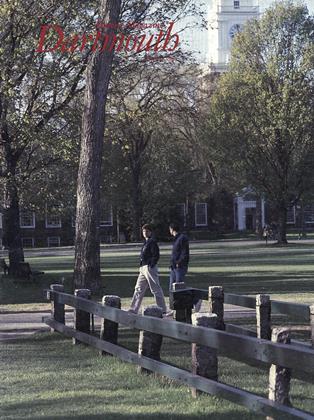Besides the usual earnest private petitions for release from snow and mud, spring brought some equally earnest public petitions to campus. One was circulated by students, the other by faculty; both were in response to the administration's March 12 decision to reinstate ROTC at Dartmouth.
Two intermediate events paved the way for the petitions. The first occurred on March 6 and 7, when concerned students collected 467 student signatures to the following declaration: "We oppose the installation of an ROTC program on the Dartmouth campus. We protest the unanimous decision of the Student Assembly to support this program." The results were forwarded to President McLaughlin, with a cover letter from David Seidenberg '85 giving three reasons for the opposition and pointing out that the 467 signatures represented "a full 15 percent" of students on campus.
On March 7, fifty-two faculty members, concerned about possible results should McLaughlin and the Trustees override the faculty's recommendation not to reinstate ROTC, signed a letter to the four deans of the faculty urging them to do "everything in their power" to preserve "the constitutional and customary right" of the faculty to "determine the academic and curricular policies of undergraduate education at Dartmouth College."
The stage was thus set for the two petitions, the first of which came from the faculty. It was drafted just before the President's March 12 announcement by professors Wood (history), Drake (earth sciences), Berthold (religion), and Roos (biology) and called for a special faculty meeting to act on the following motion: "Resolved: In view of widespread unrest over processes of governance that have developed at Dartmouth College in recent years and a concern of the Faculty over its proper role in academic governance, the Faculty of Arts and Sciences urges the Board of Trustees to appoint a Committee composed of members of the Board and members of the Faculty to review and make recommendations to both Board and Faculty on the governance of Dartmouth College." Roos described the signers as representing the entire range of faculty opinion, including some who, like Drake, do not oppose the return of ROTC.
The immediate result of the petition was the scheduling of a faculty meeting for April 29. Shortly after the meeting was set, Dean of the Faculty Dwight Lahr said in a memo to the faculty that he felt the issue went beyond governance. "The fundamental problem," he wrote, "is a difference in the ordering of priorities between the Faculty of Arts and Sciences on the one hand and the Trustees and President on the other... The Faculty's priorities are closely aligned with the desire to maintain strong academic teaching and research programs... We and the administration can and should do a better job of articulating them to the Trustees."
The students made their petition directly to the President. On April 1, during the President's student office hours, 35 undergraduates presented him with a statement "protesting his methods and policies." Two days later, the President held a "dialogue" with 55 students. Saying they were there because they cared about Dartmouth, the students asked the President some tough questions, among them inquiries on financial priorities, divestiture, The Review, ROTC, renovation and new construction, the Indian symbol, governance, and what is perceived as a pattern of announcing controversial decisions during term breaks. The dialogue was, by mutual consent, taped, transcribed, and made locally available through the Kiewit computer center. One outcome of the exchange was President McLaughlin's setting up an open meeting on April 25 in Alumni Hall between concerned students and the Trustees.
A report of the proceedings of the April 29 faculty meeting, at which President McLauglin addressed the faculty, will appear in the next issue of the Magazine. The April 25 meeting between students and Trustees will also be covered next month.
Absorbed by the latest news in The Dartmouth, sophomorePeter Murane takes a break along a temporarily-tranquil corridor in the Hopkins Center.
Dartmouth is at the edge of a forest. In the evening the students carry their dinner and their books into the depths of the woods. During the fine weather they pass the night there and the farther away the better they like it. Andre Maurois, 1928
 View Full Issue
View Full Issue
More From This Issue
-
 Feature
FeatureAlzheimer's Disease
May 1985 By Peter Blum '85 -
 Feature
FeatureThe Dartmouth College Conference Center
May 1985 By Doug Tifft -
 Feature
FeatureKappa Kappa Grandpa
May 1985 By Gabrielle Guise '85 -
 Article
ArticleFriend of the media
May 1985 By Georgia Croft -
 Books
BooksDartmouth Authors
May 1985 By Mark Woodward '72 -
 Article
ArticleRenewal of Athletics
May 1985 By David T. McLaughlin








